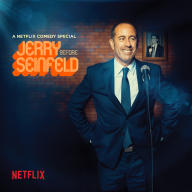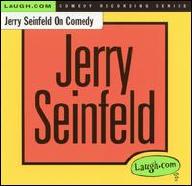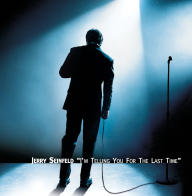Born April 29, 1954 in Brooklyn, New York, and raised in nearby Massapequa, he began his comedy career the very night he graduated from Queens College. Struggling throughout his early years, Seinfeld often performed for free in order to hone his skills, working by day in a variety of odd jobs that included selling light bulbs over the phone and hawking fake jewelry on the streets. His breakthrough arrived when he was tapped to serve as master of ceremonies at the famed New York City club The Comic Strip, and soon he was also regularly performing on the West Coast.
In 1980, Seinfeld was cast in the sitcom Benson, but was fired after just a few episodes; he returned to standup with a vengeance, and a year later made his first appearance on The Tonight Show, winning over host Johnny Carson. Countless appearances on other chat shows like Late Night with David Letterman followed, and as his recognition as a performer increased throughout the decade, he signed on to star in his first TV comedy special in 1987, the HBO production Jerry Seinfeld's Stand-Up Confidential. In 1990, NBC executives approached the comedian about starring in his own sitcom; teaming with fellow standup Larry David, Seinfeld conceived a show about "nothing" -- in other words, the small wrinkles of everyday life, from Superman to breakfast cereal, that for years had provided the fodder for his stage routine. NBC, far from convinced, agreed to produce only a miniscule four episodes.
Premiering in 1991 under the name The Seinfeld Chronicles, the show was an immediate critical hit but fared poorly in the ratings; known as simply Seinfeld from its second episode onward, the series gradually gained momentum, and NBC agreed to an order of six more episodes, followed in its third year by 13 more. Complete with one of the greatest supporting casts in TV history -- Jason Alexander (the neurotic George, inspired by Larry David), Julia Louis-Dreyfus (the brassy Elaine), and Michael Richards (nutty neighbor Kramer) -- Seinfeld gradually emerged as a cult hit, and with David at the show's creative helm, it became one of the most acclaimed series on the air -- with its infamous creed of "No hugging, no learning," the program broke new ground, its plots absurd yet grounded in contemporary life and its characters perverse and self-absorbed yet immensely likable and engaging.
By 1993 both Seinfeld and its titular star were media sensations -- not only did the show win an Emmy for Outstanding Comedy Series, but Seinfeld himself took Best Actor honors; that same year, he also penned a best-selling book, Seinlanguage. Throughout much of the decade, it remained the highest-rated sitcom on television, but in 1998 Seinfeld pulled the plug on the show, despite reports that NBC offered him a staggering $5 million per episode to continue for another 22-episode season. After the series concluded its run that May with a finale that was among the most watched events in TV history, the comedian also announced his intentions to retire all of his old standup material with a world tour culminating on Broadway; the performances yielded his first-ever comedy album, I'm Telling You for the Last Time, released that fall.
In the years following the end of his sitcom, Seinfeld stayed active touring and making the occasional television appearances. He was the subject of director Christian Charles' 2002 documentary film Comedian. In 2012, he also launched the talk show Comedians in Cars Getting Coffee. The stand-up comedy film Jerry Before Seinfeld arrived in 2017 and found the comedian returning to the New York City club Comic Strip Live where he got his start. The film's soundtrack was nominated for a Grammy Award for Best Comedy Album. ~ Jason Ankeny, Rovi














